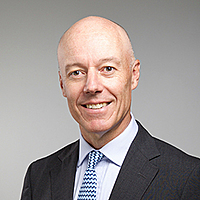Alternative asset managers: An opportunity to profit from an overlooked super trend
Recently I attended an investor conference hosted by Credit Suisse which focused on the current super trends in society. What was interesting was how the speakers identified and discussed the current societal super trends and as investors how these trends can be used as a framework for high-conviction long-term thematic investing. The current super trends the conference focused on included:
- The Silver Economy – Investing for population aging
- Millennial’s Values – including a push for a more sustainable way of doing business and the priority for fun, health and leisure
- Climate Change – de-carbonising the economy, carbon-free electricity, sustainable transport, agriculture (new farming techniques and gene editing technologies)
- Technology – including digitisation, artificial intelligence, virtual reality, Industry 4.0 (robotics, drones, healthtech)
Whilst these societal trends are at the front and centre of investment managers eyes, what I found interesting was that there was no mention of one of the largest, most pervasive super trends occurring at the moment. This is the trend towards alternative investing and the rise of the global alternative asset managers. In a time where global markets have been shocked by the COVID pandemic, the S&P has roller-coasted from an all-time high in February 2020 before plummeting more than 25 percent in March 2020. As such, alternative assets have been highly sought after in an effort to make investor’s investment journey smoother.
Currently there are a number of powerful themes that are driving investors to invest more in alternative assets. These include:
- Low interest rates – investors are investing in real assets and private credit in the quest for yield and longer duration which they once received from investing in sovereign or corporate debt.
- Alpha – outperformance in public equity markets was always hard to achieve but it has only become more difficult or arguably impossible. Investors are now seeking outperformance through alternative assets that are less informationally efficient.
- Liquidity – investors are becoming more sophisticated in the way they manage liquidity so that they can invest more in illiquid assets, thereby earning an illiquidity premium.
- Allocation of fee budgets – investors are investing more in low fee (or no fee) passive public equity or fixed interest strategies and allocating their fee budgets to higher returning, higher fee alternative assets.
- Access – there has been enormous innovation and many areas that were inaccessible to investors are now available. For example, even retail investors can now gain access to private equity, private credit, infrastructure, venture capital, insurance-linked securities, opportunistic property etc.
Some sense of the scale of the investment in alternative investments can be gained by looking at the portfolio allocation of the Future Fund, Australia’s sovereign wealth fund.
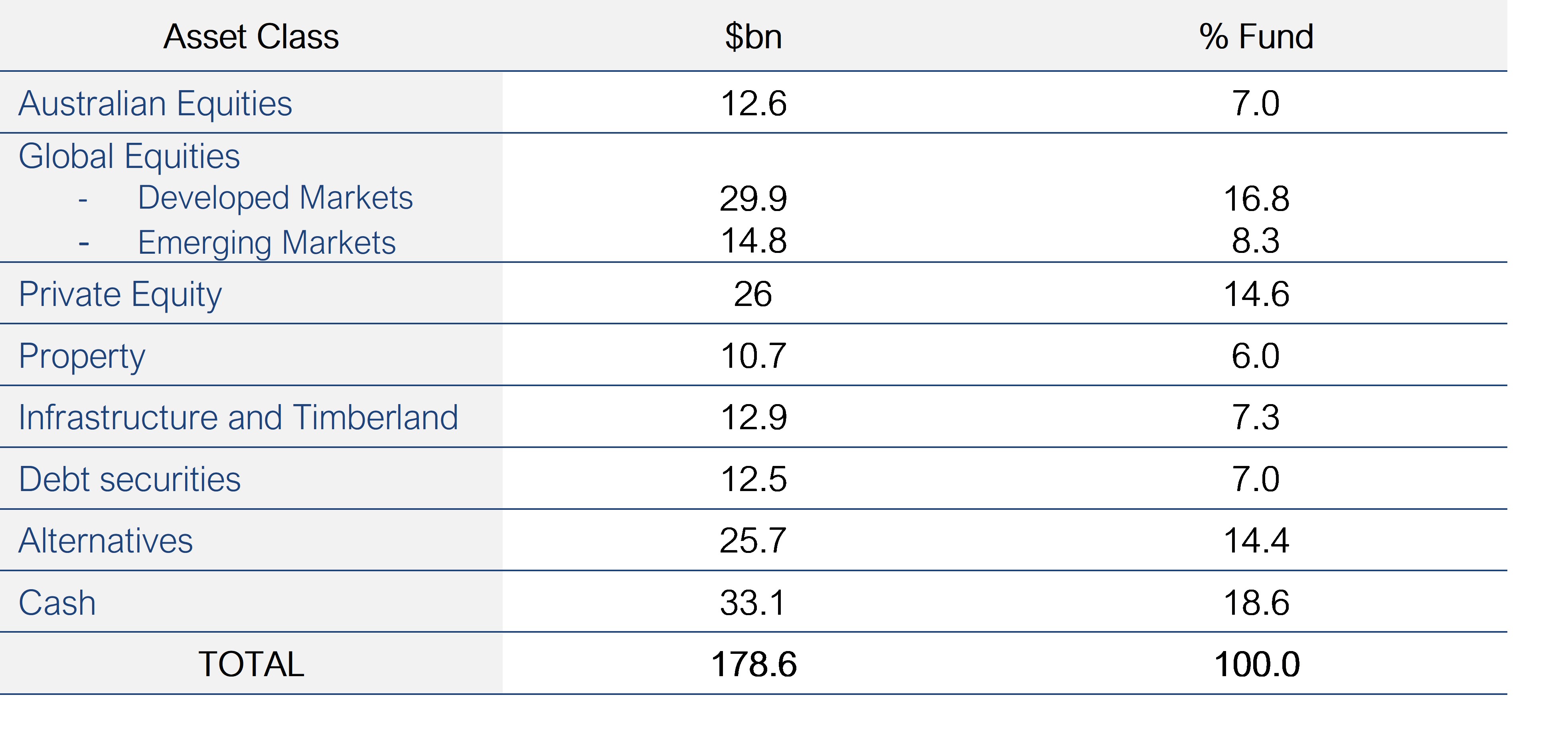
The wholesale shift towards alternatives by
institutional investors is now in full swing but it has been occurring steadily
over the last 20 years. David Swensen,
the Chief Investment Officer of the Yale University Endowment, and author of the
book Pioneering Portfolio Management – An Unconventional Approach to
Institutional Investment, was one of the early pioneers of alternative asset
investing. He achieved remarkable
returns for the Yale Endowment over a long period of time. Yale’s investment
office generated returns of 10.9% p.a. in the decade through to June 2020 (the best
amongst the Ivy League universities, and 9.9% p.a. over 20 years. Under his management, Yale University became
the third wealthiest university with a $31.2 billion endowment as of June 2020.
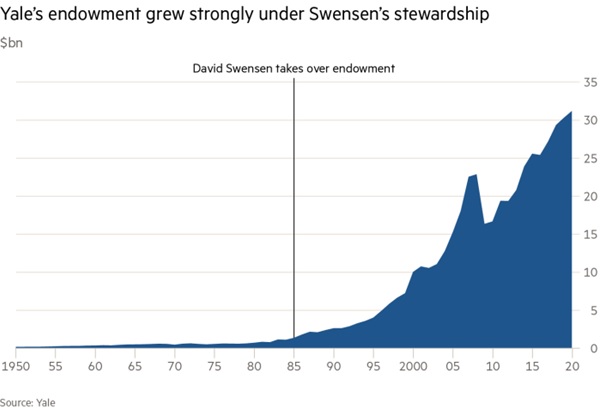
Embracing Swensen’s compelling arguments for allocating more to alternative assets, institutional investors, like the Future Fund, are steadily increasing their allocations to private equity, infrastructure, private credit and other alternative assets.
According to data from Preqin, the median allocation to alternatives of global public pension funds has increased from 18% in 2010 to 30% in 2020.
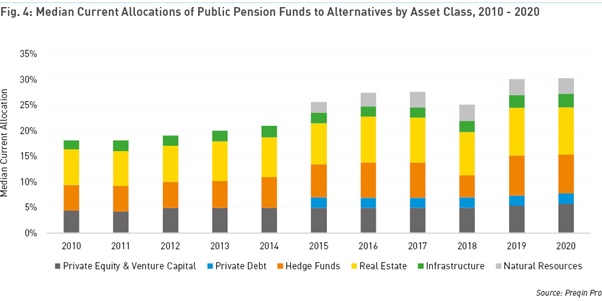
Unlike liquid markets, where allocations can be made quickly, it takes time to “get set” in alternative assets. Many institutional investors are still well below their alternative allocation targets and it will take years for them to reach their objectives - which is good news for established alternative asset managers. But it is not only institutional investors who are seeking to invest in alternatives. Family offices, high net worth investors and retail investors are all seeking to do the same. This presents a massive fundraising opportunity for alternative asset managers with global scale, diversified platforms, and a proven track record in an increasingly competitive market.
The investors who are alive to this super cycle stand to make very strong investment returns by investing with some of the alternative asset managers best placed to take advantage of this seismic shift in investing.
Until
recently, alternative asset managers operated as “boutiques” or private firms
normally owned by the founding partners.
However, over the last decade, a number of alternative asset managers
have listed and are scaling to sizes that were unimaginable a decade ago. Examples of some of the leading listed alternative
asset managers that have achieved global scale are:
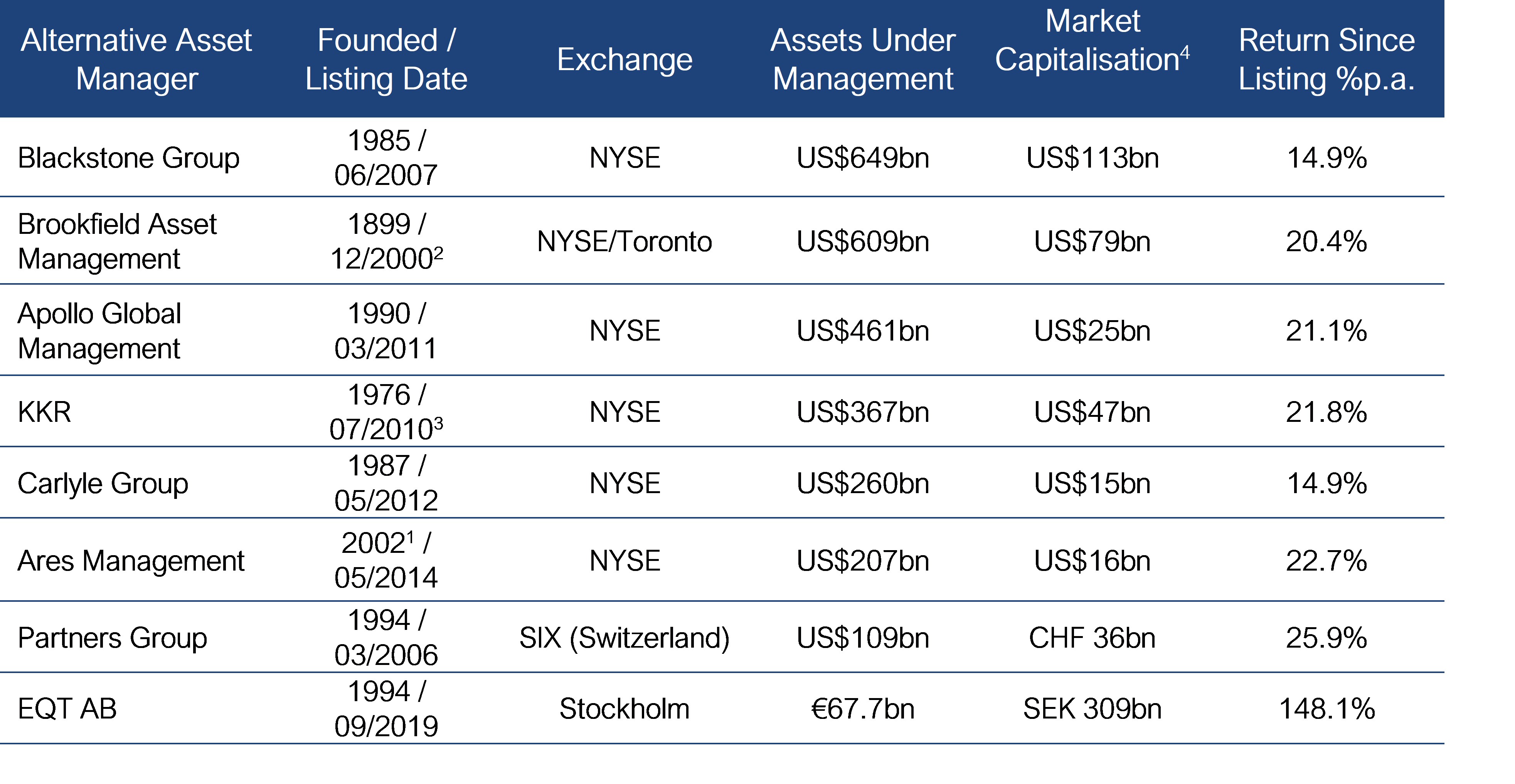
As at 31 March 2021 except Partners Group (31 Dec 2020)
- Ares Management was first formed in 1997 and spun out independently from Apollo Global Management in 2002.
- Date of relisting from AMEX to NYSE by Brookfield’s predecessor company, the Brascan Corporation. In 2005, Brascan changes its name to Brookfield Asset Management.
- KKR completed its merger with publicly traded investment affiliate KKR Private Equity Investors on Amsterdam Euronext in October 2009. KKR relisted to the NYSE on 15 July 2010.
- Market Capitalisation as at 07 June 2021.
Of the alternative asset managers, Blackstone has scaled to be the largest in scale and scope. Although its share price has surged over the past few years, we think the business will continue to grow at 15% per annum through a combination of organic growth and strategic acquisitions.
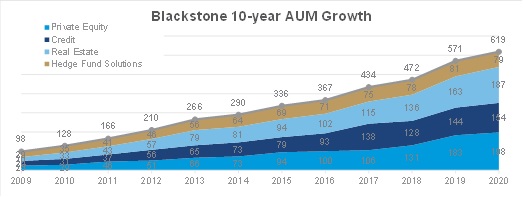
When Blackstone successfully completed its IPO in June 2007 it had “just” $83 billion in assets under management (AUM). Fourteen years onwards in 2021, AUM has grown almost 8 times to $649bn.
Blackstone paid what seemed like a handsome price for alternative credit manager GSO. It paid an up-front payment of $635 million for a $10 billion AUM business back in 2008. But the acquisition was perfectly timed with the Global Financial Crisis credit market dislocation and, fast forward to today, the GSO business (recently renamed Blackstone Credit) has grown to $160 billion in AUM (35% of overall AUM). Giving some sense of just how fast a business can scale within the Blackstone fold, GSO now generates over $600 million in base management fees alone and is one of the largest and most dominant alternative credit platforms in the world.
In 2013 Blackstone acquired Strategic Partners, Credit Suisse’s private equity secondary fund business. At the time Strategic Partners were investing their fifth fund which closed at just under $3 billion in 2012. In the five short years Strategic Partners has been within the Blackstone stable, they have raised two successor funds and over $15 billion.
Using cash and its own listed units, Blackstone has a very strong currency with which to make more strategic acquisitions that can be quickly scaled when integrated into the Blackstone platform.
Blackstone – Acquisitions Since IPO
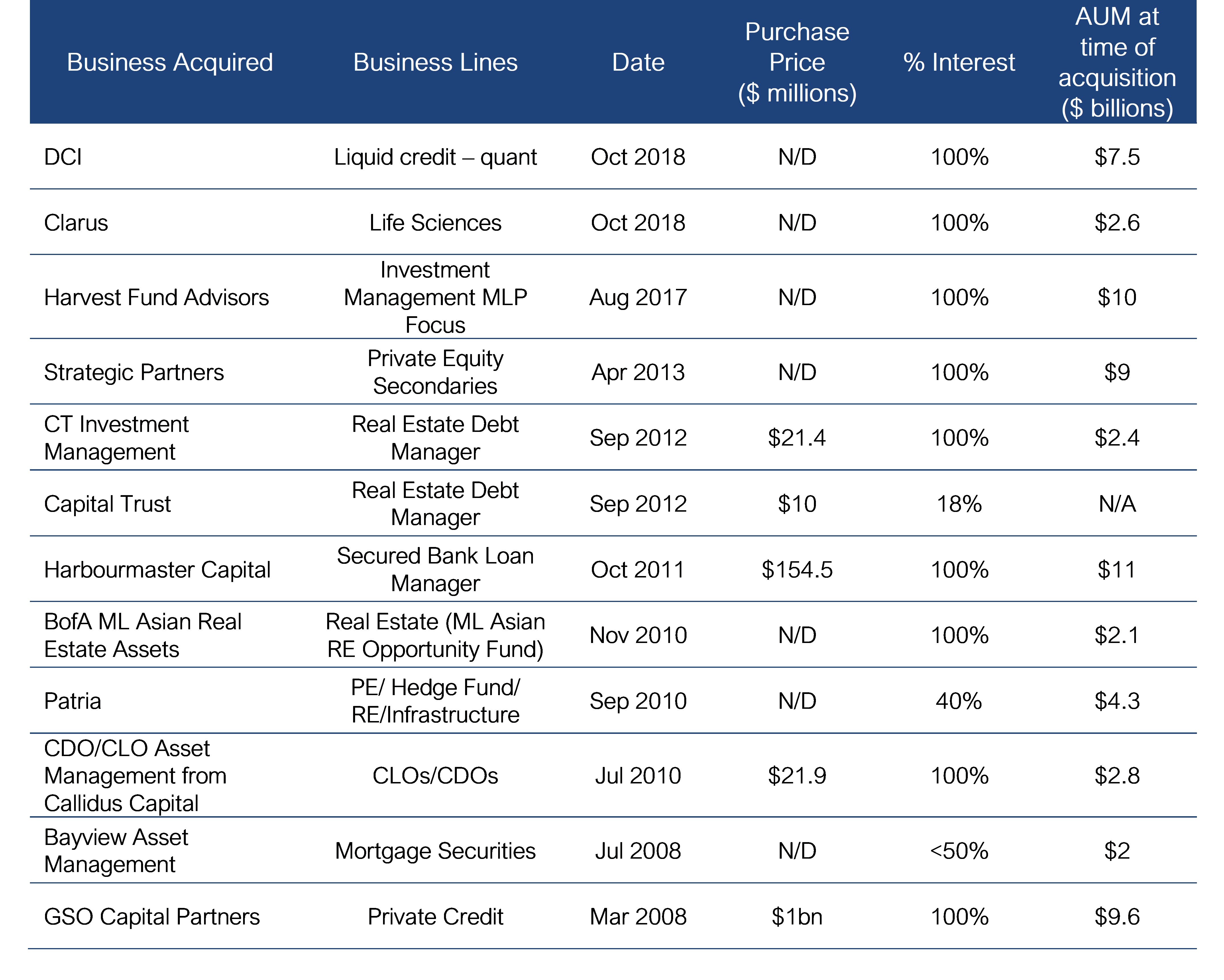
I believe the secular demand for alternative assets will persist in the low-rate environment and continue to disproportionately benefit the established leading asset managers who have scaled investment platforms, deep client relationships and are able to deploy significant amounts of capital across multiple strategies.
This rise in global alternative asset managers is a super trend investors are not going to want to miss out on.
Bloomberg – “David Swensen, Yale Endowment’s Pioneer Manager, Dies at 67” by Janet Lorin May 6th 2021.
Blackstone press release dated 10 January, 2008 – “Blackstone to Acquire GSO; Announces $500 Million Unit Repurchase Program”
Four reasons to register for Livewire’s 100 Top-Rated Funds Series
Livewire's Top-Rated Fund Series gives subscribers exclusive access to data and insights that will help them make more informed decisions.
Click here to view the dedicated website, which includes:
- The full list of Australia’s 100 top-rated funds.
- Detailed fund profile pages, with data powered by Morningstar.
- Exclusive interviews with expert researchers from Lonsec, Morningstar and Zenith.
- Videos and articles featuring 16 top-rated fund managers.
